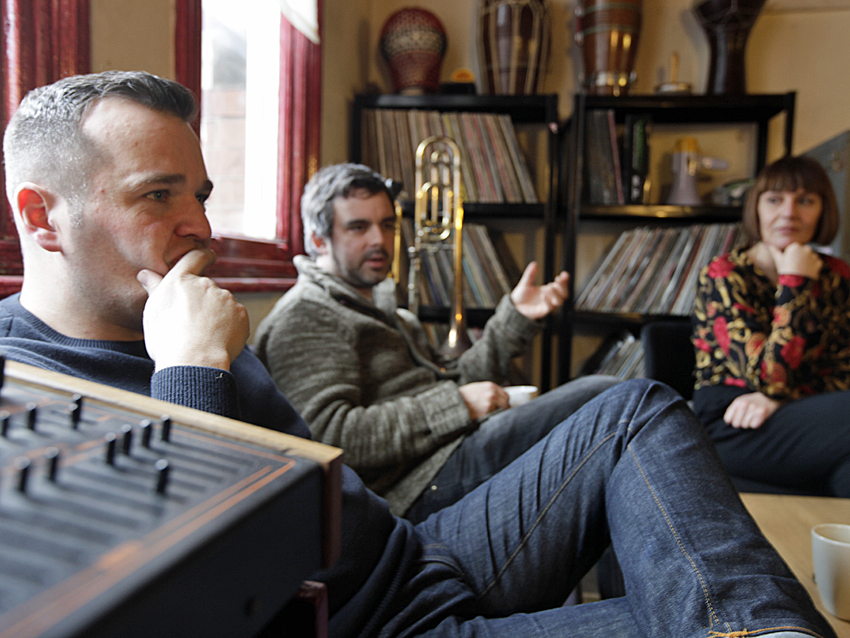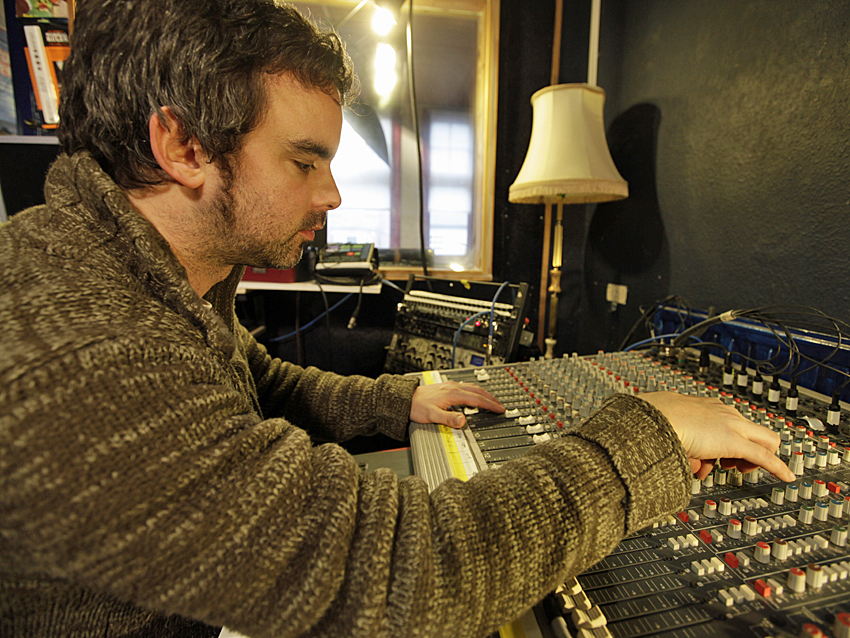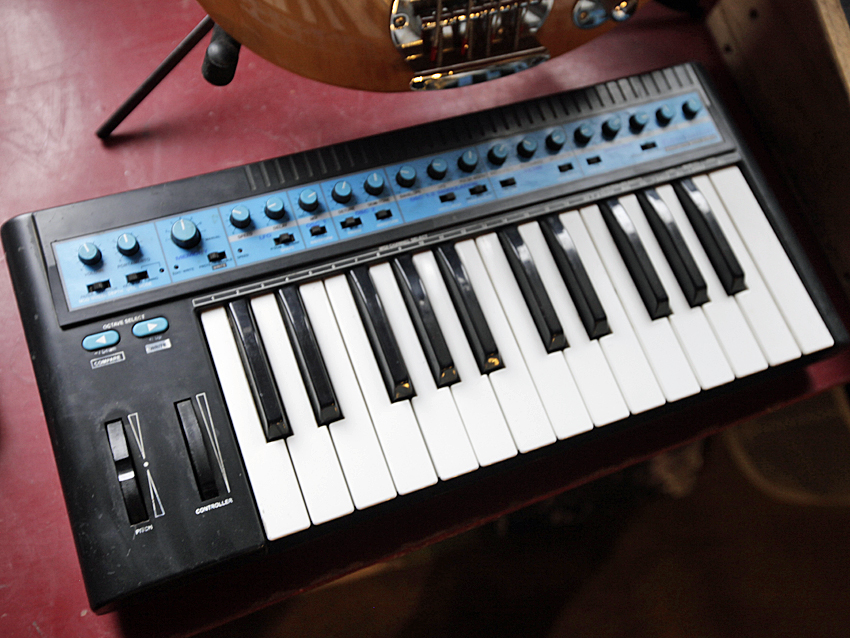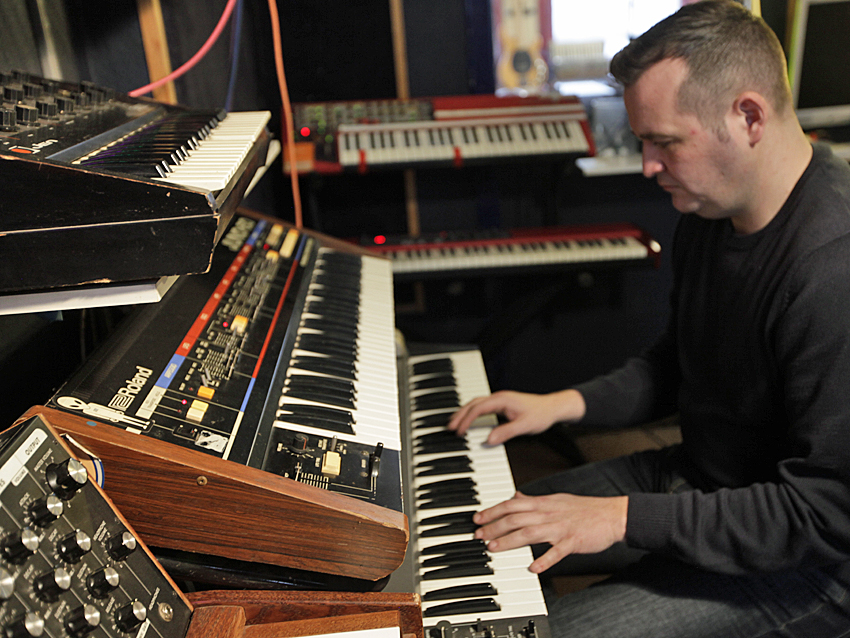Crazy P Interview and video studio tour
Take the guided tour of their studio and read about their career in music
Starting out as a duo in 1995, huddled over an Atari and Akai S-series sampler, Crazy P draw influence from the broad branches of House, taking a distinctive live approach and combining it with a DJ-friendly production slant.
The result is that elusive pedestal - music that feels equally at home in your own, and in the club; a trait eloquently portrayed on their 2011 album When We On. iTunes agreed, naming it Dance Album of the Year, and major labels came knocking with Empire of the Sun, Little Boots and Sam Sparrow all seeking the CP treatment.
Now, in 2013, their long-time label friends 20/20 Vision have released a remix pack of the album featuring reworks from Disco House heavyweights like Huxley, Maurice Fulton, Mario Basanov and Jamie Jones. With 15 years production experience to speak of, riding the wave of their most successful album to date, and with the Disco revival seemingly here to stay, we headed to their Nottingham studio to discover the story behind the sound.
How did you start making music together?
Chris Todd: "Me and Jim met in Nottingham and had a mutual love of similar sorts of music. We had both just started to mess around with similar setups, using an Atari and an Akai sampler."
Jim Baron: "At that time we were going to loads of car boot sales, picking up loads of old records. It was the mid-90s and House music was kind of at the top of its tree. We used to come home, load the records into the sampler and away we went."
What was the goal with those records?
CT: "They were just for fun, really. At that time it was much harder to make a professional tune and distribute a record, so it was just a part of hanging out and being mates."
JB: "We did that for three or four years and then we met Dani [Danielle Moore, vocalist] in Manchester. Even though she had no professional experience, you could tell she was an entertainer from parties and seeing her hold court. We had a jam round mine and, next thing we knew, the first song was written.
Want all the hottest music and gear news, reviews, deals, features and more, direct to your inbox? Sign up here.
Danielle Moore: "We had a love of the same type of music. I was buying lots of records and DJing in my bedroom. I got into Rare Groove and Disco and used to go to the Electric Chair and the Hacienda. That's where I met the guys."
Who were your inspirations at the time?
JB: "Labels like Paper, Nuphonic and 20/20 Vision had just started making really good Disco-tinged Housemusic and we were into those records. If you had to nail it down to something, it was that sound. Our first release was on Paper."
You're very much a live band now, but was the focus on playing live back then or was it simply the only way to take your music on the road?
CT: "It wasn't something we set out to do, but as soon as Dani came aboard we started getting offers for live shows. We'd done a couple, just me and Jim, DJing and triggering a sampler. We did one gig where we basically brought the whole studio! Having done a few like that and then having a singer, we felt like we needed to get a band. We had a couple of mates we'd been working with so it made sense."
"Some new House sounds like it's join-the- dots stylistically... They're jumping on the bandwagon and ticking the boxes."
Do you find yourselves layering a lot of live instruments to make them work in the club?
JB: "For sure. I remember when we did The Hit. It was all live but there were a lot of textures created by layering. Things like sticking a low piano octave on a bassline to add to the texture at the bottom but not the tone as such. Very much like putting a Disco record together."

What was the biggest learning curve when you started producing your own tracks?
JB: "Live recording. We were limited to what we could do because of sampler memory and recording time restrictions so we were very tied to loops. That wasn't necessarily a bad thing, and it probably added to the style, but being restricted to eight bars here and eight bars there was very frustrating."
CT: "When we got this place [the studio] it became a lot easier. We mixed the first couple of records for Paper Recordings in their studio because they were essentially written in our bedrooms and we didn't have the means to record. Since getting our studio, it's been a slow learning and building process to get our sound by taking more risks and jumping in feet first."
Did you take any production courses or was it all trial and error?
CT: "I took one and picked up a few bits and pieces, but you can't beat just getting in there, making mistakes and making discoveries. Learning from other people too. Bob Sadler [Secret Stealth] is a friend of ours who's a really brilliant mix engineer. He taught us more about the maths side of production. Rick Pete is our front-of-house sound engineer and our man-on-call." [Laughs]
JB: "I'd only ever mixed by ear, but Bob is so methodical. He'd know exactly where to put an EQ cut to make things fit and was a lot more clinical."
CT: "It was a bit extreme, but you had to go thatfar to realise it was a bit too much. We had to temper it, but I learned so much about EQ from Bob."

It's difficult to be both creative and scientific...
JB: "Yeah. I'm a big fan of producers like Moodyman and we used to play it to Bob and he'd be like 'Get it off! This is awful!' I heard it in a club last week and it blew my head off! Yeah the bass might be a bit too loud, it sounds like it's a bit thrown together and the claps are out of time, but I like that. Things are alive."
CT: "You can get a little bogged down with the details if you allow yourself. I've certainly gone downthat route in the past and have chilled out a bit since. Both extremes are valid. It's about getting a balance."
JB: "Rick engineered our last album that we did here, and what we learned was there are so many ways to do things you just have to apply the right technique to the situation. He was making kickdrum mics out of speakers and doing whatever needed to be done to get what we wanted. That was a massive contrast to Bob's approach."
Are you inspired by that more organic approach?
CT: "Very much so on the lastalbum. We tried not to get bogged down in our mic choices or how it sounded. We just thought,'Getit in the computer.' There's a lot of stuff on the last album that Dani recorded through the Boss Loop Station and it has spill from the other tracks. We tried to re-record it cleanly but it just wasn't thesame so we left it. It's important not to be too precious, and that's quite liberating."
What is the one bit of kit you'd never sell?
CT: "For me it's probably the [Novation] BassStation, although I just had to buy a new one'cos mine is broken. It was my first purchase. It's not the most amazing keyboard but I learned how to make sounds from scratch on it. I think it was marketed as a 303 emulator. It doesn't do that very well but has its own sound."

JB: "Usually I'd say the Moog Voyager, but the Godwin [String Concert synth] is something we just got and I love it. We've always had to use plug-ins or sample libraries for strings, and the Godwin sounds so amazing. There's no top-end and it just sits so nicely in the mix."
DM: "The [Boss] Loop Station was a revolution for me because it allows me to get involved in the writing process without disturbing what the guys are doing. I can record straight away and decide if we want to keep little hooks. It's very immediate. The one downside is you get carried away with short loops instead of writing a song, but it's definitely helped. The [TC Electronic] Helicon VoiceLive and the VoiceLive Touch are great for vocalists and provides a wonderful compliment to your voice."
And you're using Logic in the studio?
CT: "Yeah. We've been on Logic since we moved from the Atari. We use a lot of the Logic plug-ins 'cos they're really good. The EQs and compressors... really intuitive. We've got some Waves plugs, too - the Vocal Bundle with the Renaissance plugs."
JB: "Synth-wise, we don't tend to use a lot of plug-ins. If we're on the road we'll use them to write stuff but, when we get back to the studio, they get replaced with one of the outboard synths."
What's your remixing approach?
CT: "It depends on the parts. It's difficult because you want to do something you're proud of rather than just going through the motions. So it's about finding something we're happy with, either by cutting up the vocal or, if we like it, loading it up and playing along to try and find something that works."
JB: "Initially we took on a lot more than we do now. We thought, 'Sure we can do something with that' and then a week later we're banging our heads against the wall. It's usually a case of, when you first hear the track, if you have an idea just go with it rather than forcing something."
"The bass might be too loud, it sounds like it's a bit thrown together and the claps are out of time, but I like that. Things are alive"
Disco has undoubtedly seen a resurgence over the last five years...
JB: "Sure, but I think that by the very nature of themusic - being the first club music - it's always gonna have an affinity to Dance music. It never went away for us, though. The labels that really inspired us, like Paper and Nuphonic, that's what we would have considered the sound to be. And it wasn't even a genre back then. There's an obvious link between Disco and House but that explosion just made it more acceptable."
DM: "What did happen, is that we were pigeonholed more. What was House music was now Nu Disco. People like to tag things because they feel comfortable with it, but we'd always been making that kind of thing before it was given a name. To a degree you feel like you then have to service that genre, but Jim is classically-trained, Toddy [Chris] is a musician, and I'm an entertainer and dancer so between us we bring a lot more than just one or two genres to the table."
B: "Some of the new House sound seems like it's kind of join-the-dots stylistically. You can identify those records straightaway, either because they're trying to replicate what they did last time or because they're jumping on a bandwagon and ticking the boxes. You canunderstand that, though. There's so little money in music you can understand why some people follow wherever it goes!"
DM: "We've also noticed a difference DJing out and club culture in general. There's an element of people feeling safety in numbers and jumping ontrends. When we went out, we danced all night, we sweated and didn't take photographs of each other. Now people hang around the DJ booth, talking, or looking at what you're doing. Club culture has changed and younger DJs are under more pressure to look good, be part of a scene and tick certain boxes. We were lucky enough to play at a club in Berlin called Wilde Renate and it really restored my faith in what I thought had gone."

What do you think is the main cause behind that culture dwindling?
CT: "I think technology is a big part of why people expect less. If you want to go from 95 to 130bpm you can, just don't press the sync button. If people want to be lazy, they can be. Technology can be used in a really experimental and interesting way, or you can just press sync. It's made it all much more accessible and taken the skill out of learning your craft. Anyone can come along and do a standard DJ set. Computers are so cheap these days and getting the music is easy."
JB: "It does take talent, though. I really rate people like Henrik Schwarz. I saw him do his Ableton Live show. It was amazing and he really inspired me. You can see he has a real passion for his productions and for keeping things different. Anyone can use that technology brilliantly but most choose not to."
DM: "I think you can apply that to any creative craft. [Technology] has opened the doors to people thinking they can do everything. Everyone wants to be a DJ and now anyone can, but the number of quality DJs is still small."
CT: "What's also really telling of the psychology of the crowd now is the amount of requests you get. I wouldn't dare [request], and I wouldn't want to ask any DJ to play anything. But the amount of people who don't think twice about requesting and holding up their iPhones [is big]."
JB: "You would hope that original essence of making music, of people in a room playing together, getting excited and bouncing off of each other would continue. But in House music that seems to be evaporating."
This is a depressing note to end on...
CT: [Laughs] "One of the most positive things about how technology has evolved is that it's created a global community. People are no longer isolated, depending on where they live, and people can find new music and collaborate with people across the world. It brings people together and that's really important. Inevitably it opens the door to some mediocrity, but there are a lot of magical things happening too."
DM: "There are lots of new artists floating our boat but we don't know what's going to happen next. No one knows what's going to happen. That's why it's so exciting."
Crazy P's latest album, Remixed, is on sale now. Go to www.crazyp.co.uk for the latest information, album details and live dates.


Future Music is the number one magazine for today's producers. Packed with technique and technology we'll help you make great new music. All-access artist interviews, in-depth gear reviews, essential production tutorials and much more. Every marvellous monthly edition features reliable reviews of the latest and greatest hardware and software technology and techniques, unparalleled advice, in-depth interviews, sensational free samples and so much more to improve the experience and outcome of your music-making.
